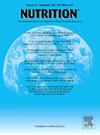Altered free fatty acids levels and the onset of metabolic syndrome in childhood cancer survivors
IF 3.2
3区 医学
Q2 NUTRITION & DIETETICS
引用次数: 0
Abstract
Childhood cancer survivors (CCS) are at increased risk for various health issues, including obesity, insulin resistance, hypertension, and dyslipidemia, resulting in the development of metabolic syndrome (MetS) later in life. It has been suggested that anticancer treatment may lead to alterations in lipid metabolism, which play a role in the pathogenesis of metabolic syndrome among CCS. The prospective study included 110 CCS, with a follow-up time of 6.39 years since the end of treatment. Fasting serum of fourteen fatty acids concentrations were measured in all children using gas-liquid chromatography. Among the study group, 41 CCS (37%) met 1 or more criteria for metabolic syndrome and exhibited higher concentrations of myristic (P = 0.002), palmitic (P = 0.003), stearic (P = 0.017), oleic (P = 0. 019), arachidonic (P = 0.002), lignoceric (P = 0.005), docosahexaenoic (P = 0.005), and total fatty acids compared to CCS without metabolic syndrome factors. Additionally, overweight or obese CCS presented higher levels of myristic (P = 0.048), palmitic (P = 0.016), oleopalmitic (P = 0.019), stearic (P = 0.024), oleic (P = 0.020), α-linoleic (P = 0.023) and behenic (P = 0.036) acids compared to survivors with a normal BMI. Childhood cancer survivors develop abnormalities in lipid metabolism, which may contribute to an earlier onset of metabolic syndrome. Additionally, overweight or obesity significantly exacerbates changes in lipid metabolism.
儿童癌症幸存者游离脂肪酸水平的改变与代谢综合征的发生
儿童癌症幸存者(CCS)患各种健康问题的风险增加,包括肥胖、胰岛素抵抗、高血压和血脂异常,导致生命后期代谢综合征(MetS)的发展。有研究表明,抗癌治疗可能导致脂质代谢的改变,这在CCS代谢综合征的发病机制中起作用。前瞻性研究纳入110例CCS,治疗结束后随访6.39年。采用气液色谱法测定所有儿童空腹血清中14种脂肪酸的浓度。在研究组中,41名CCS患者(37%)符合1项或1项以上代谢综合征标准,并表现出较高的肉豆蔻脂(P = 0.002)、棕榈脂(P = 0.003)、硬脂脂(P = 0.017)、油酸(P = 0.01)浓度。019)、花生四烯酸(P = 0.002)、木素酸(P = 0.005)、二十二碳六烯酸(P = 0.005)和总脂肪酸与没有代谢综合征因素的CCS相比。此外,超重或肥胖的CCS患者的肉豆酸(P = 0.048)、棕榈酸(P = 0.016)、油棕榈酸(P = 0.019)、硬脂酸(P = 0.024)、油酸(P = 0.020)、α-亚油酸(P = 0.023)和白酸(P = 0.036)水平高于BMI正常的幸存者。儿童癌症幸存者在脂质代谢方面出现异常,这可能导致代谢综合征的早期发病。此外,超重或肥胖显著加剧了脂质代谢的变化。
本文章由计算机程序翻译,如有差异,请以英文原文为准。
求助全文
约1分钟内获得全文
求助全文
来源期刊

Nutrition
医学-营养学
CiteScore
7.80
自引率
2.30%
发文量
300
审稿时长
60 days
期刊介绍:
Nutrition has an open access mirror journal Nutrition: X, sharing the same aims and scope, editorial team, submission system and rigorous peer review.
Founded by Michael M. Meguid in the early 1980''s, Nutrition presents advances in nutrition research and science, informs its readers on new and advancing technologies and data in clinical nutrition practice, encourages the application of outcomes research and meta-analyses to problems in patient-related nutrition; and seeks to help clarify and set the research, policy and practice agenda for nutrition science to enhance human well-being in the years ahead.
 求助内容:
求助内容: 应助结果提醒方式:
应助结果提醒方式:


